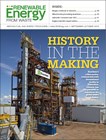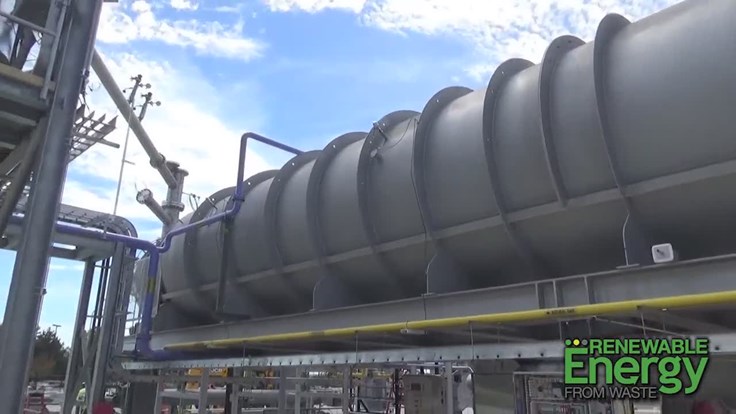Refuse-derived fuel (RDF) from an alternative fuel feedstock preparation system designed, engineered and constructed by Vecoplan LLC was used in the first production of methanol at commercial scale at Enerkem Alberta Biofuels, in Edmonton, Alberta, in September.
Vecoplan, based in Archdale, North Carolina, commissioned the multimillion dollar, state-of-the art alternative fuel feedstock preparation system for the city of Edmonton in May 2013. It is considered an integral component of Enerkem Alberta Biofuels, one of the world’s first industrial scale municipal waste-to-biofuels facilities.
Vecoplan, under contract by the city of Edmonton, was responsible for all construction of the RDF/waste processing facility, which supplies feedstock to the adjacent Enerkem Alberta Biofuels facility for conversion into biofuels and renewable chemicals.
"Vecoplan is honored and proud to be selected and included in such an important project in the field of waste-to-energy,” says Greg Parent, Canadian sales, Vecoplan LLC. “We truly feel that Enerkem is breaking new and important ground in the management of MSW and the creation of renewable fuels. We do not underestimate the trust that has been placed in Vecoplan as we understand the importance of having our equipment meet both the production rate and RDF quality required to ensure Enerkem is successful in implementing and commercializing their technology."
The Vecoplan feedstock preparation system, located on Edmonton Waste Management Centre (EWMC) campus, incorporates advanced receiving, preshredding, conveying, screening, separating and re-shredding. The mechanical feedstock preparation system is designed to produce 100,000 dry metric tons of RDF per year. The feedstock consists of waste that cannot be recycled or composted and has traditionally been sent to a landfill.
Materials are received on the tipping floor of the feedstock preparation facility, which includes a load enclosure and steel belt conveyor. A Hurricane VVZ310 T dual-shaft shredder performs a preshred of the materials. Waste screens filter out minus-1-inch materials. Overbelt magnets remove ferrous metals, while eddy current separators remove nonferrous metals. Wind sifters remove heavy materials, such as rocks and glass. VIC (Vecoplan Integrated Controls) automated control system that integrates controls for the entire RDF processing plant.
The RDF, described as “garbage fluff” by Enerkem, is transported from the EWMC to the Enerkem facility via a Vecobelt air-ride conveyor. Where it is stored in Vecoplan bunkers with built-in load-unload conveyors. The material is meter fed for conversion into Enerkem’s conversion process via Vecoplan screw conveyors.
Enerkem has a 25-year agreement with the city of Edmonton for the feedstock produced at the preparation facility and Parent says Vecoplan plans to continue to support its integral role ensuring the successful RDF production for the conversion process.
"Vecoplan views both the city of Edmonton and Enerkem as partners and we're committed to supporting the facility long term,” says Parent. “We are in constant communication to ensure that the RDF being supplied optimizes Enerkem’s process and to help with any adjustments that are required. We look forward to continuing to work with the City of Edmonton and Enerkem as their needs evolve."
Refuse-derived fuel from Vecoplan system helps Enerkem achieve commercial-scale methanol production
Vecoplan constructed facility which prepares the nonrecyclable household waste for the conversion to biofuel at Edmonton Alberta Biofuels.
- November 23, 2015
- REW Staff



